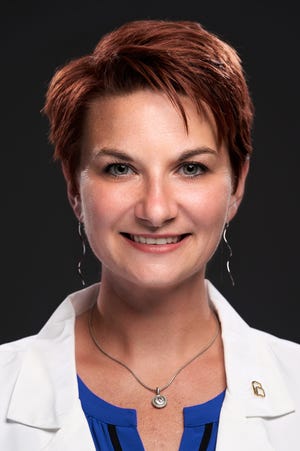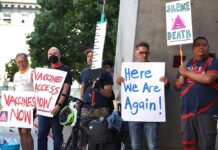
Like many transgender and trans-expansive people, Beth Gombos dreaded going to the doctor’s office and felt as though medical professionals weren’t prepared for or interested in understanding Gombos’ health concerns and issues.
“A lot of the time we won’t go to the doctor because we know we are going to have to give them the Trans 101,” Gombos said. “People walked into the emergency rooms with broken bones and had to explain to six different doctors their genital situation before they could even get an X-ray.”
Gombos eventually found a healthcare clinic with providers that understand, affirm and respect Gombos holistically: a Planned Parenthood clinic in the St. Louis area.
“It was life changing,” Gombos said. “For the first time I experienced what it was like to have a health care provider that was actually listening to me, felt like they believed me and actually cared about my well being and my whole self.”
At that Planned Parenthood clinic, Gombos, who identifies as transmasculine, was able to begin gender-affirming hormone therapy.
Gombos now serves as an outreach coordinator with the Metro Trans Umbrella Group (MTUG), a grassroots nonprofit advocacy group that is dedicated to providing social and emotional support for the trans-expansive community.
MTUG is based in the St. Louis area, but Gombos and other MTUG staff spent time in Springfield and Joplin over the summer to train Planned Parenthood staff about how to treat and better serve trans clients. They will also do the training at all new-hire orientations.

MTUG and Planned Parenthood of the St. Louis Region and Southwest Missouri (PPSLR) partnered this year to create TRANSforming Community TRANSforming Care, a more than $3 million program that will expand health care services, conduct trauma informed research, and build a sex education curriculum tailored toward the transgender community.
“Institutional discrimination and inflammatory political rhetoric against trans people have contributed to gaps in health care access and data that could help improve trans care. MTUG and PPSLR will build a community driven research and health care delivery model that centers trans and non-binary people with a focus on creating inclusive and safe spaces for patients to access care, share experiences, and provide feedback,” a release said. “TRANSforming Community TRANSforming Care will also break ground on a telehealth space at MTUG’s headquarters for individuals who don’t have access to technology that allows them to utilize telehealth services.”
This is Missouri’s first trans health care partnership that is aimed at expanding access to care regardless of a patient’s ability to pay. TRANSforming Community TRANSforming Care is designed for and by the trans and non-binary community.
Funded by a four-year grant from the Missouri Foundation for Health, the program is part of the foundation’s “commitment to eliminating the underlying causes of inequities within all aspects of health,” the release said.
“We envision a Missouri in which systems and structures promote health and well-being for all and every Missourian has access to high-quality care,” the foundation’s president and CEO Bob Hughes said in the release. “This project, as part of the foundation’s Opportunity Fund program, is aligned brilliantly with the goals of the program, in which we seek to disrupt the state-specific circumstances that allow inequities to exist.”
‘It gives me hope’
With the TRANSforming Community TRANSforming Care program, transgender and trans-expansive people can receive health care, including gender-affirming hormone therapy, without worry of being judged or harmed. If they are uninsured or underinsured, they pay what they can on a sliding scale.
“It’s a really big deal,” Gombos said. “I am 34 years old and up until I started going to Planned Parenthood in January of last year, I never really had a doctor that I felt like actually cared about my health.
“When I go to the doctor and I know they actually care about my mental health and my physical health and they are not just doing it to get a paycheck, and I’m not a pain in the ass because I’m different from everyone else,” they said, “it’s been life changing. And it’s affected me greatly, and it’s given me hope. And that is what we are trying to give the rest of the community.”

MTUG Co-founder and Executive Director Sayer Johnson lead the July training at the Planned Parenthood in Springfield. He spoke with the News-Leader about the partnership between MTUG and Planned Parenthood and the TRANSforming Community TRANSforming Care program.
The partnership of MTUG and Planned Parenthood eliminates discriminatory barriers in healthcare and will hopefully set a new standard for trans care, Johnson said.
“It is beautiful to be a transgender person. I love being transgender,” he said. “But it is brutal, and it is challenging. And the systems are not built for us. So this is a merger of the beauty and the brutal together to create some systems that nurture us with that hierarchy of needs.
“If we cannot get our basic health care needs met, we cannot strive,” Johnson said. “That is what we want to do. Planned Parenthood is helping transgender people thrive.”
Johnson shared some his own bad experiences with healthcare during the training. About two years ago he broke his foot and needed surgery to fix it.
Johnson said that after the surgery the doctor asked why he didn’t say he was trans, and he wondered why the surgeon was even looking at that part of his body.
“That kind of stuff happens all the time. That was not horrifying to me, but it could be for another transgender person,” he said. “We literally won’t go seek care because we are afraid of being harmed.”
During the training, Sayer and his team spoke about the barriers and difficulties the transgender community faces including the increased risk of homelessness and housing discrimination, and of being physically and sexually assaulted.

According to data presented, 4.6 percent of the overall population has reported a suicide attempt. The number climbs to 10 and 20 percent for those who are gay, lesbian or bi-sexual, Johnson said.
“By comparison, 41 percent of trans-expansive humans in this here United States have attempted suicide at some point in our life,” he said. “That is a statistic that needs to be wiped out.
“We do not attempt suicide because we are trans-expansive. We attempt suicide because systems are not built for us because it can be violent just to be in our bodies and to get on the bus,” Johnson continued. “This is why we are doing this work. This is why Metro Trans Umbrella Group exists.”
To prevent folks from being emotionally harmed when seeking care at Planned Parenthood, the MTUG folks also spoke at great lengths about the use of a client’s pronouns and name (which might not always be the same name that is on their insurance card or other documents).
And if a person accidently uses the wrong pronoun or name, Johnson said the best thing to do is to apologize quickly and move on.
“Do not make that other human do emotional labor to feel better about your screw up. You screwed up. Own it. Apologize and move on,” Johnson told the Planned Parenthood staff.
Gombos encouraged avoiding gendered terms like sir or ma’am when addressing new people.
“I had a very gender euphoric moment in the Popeyes drive-thru,” Gombos shared with the group. “They were giving me my total and they said, ‘Is that all for you today, friend?’
“I don’t know if it was my voice and it confused them, or if they were a person that knew not to gender a stranger,” Gombos said, “but it made my day. I won’t forget that: the one time I was in the Popeye’s drive-thru and they didn’t sir or ma’am me. It was great.”
‘A matter of life or death’
Dr. Colleen McNicholas is the Chief Medical Officer for Planned Parenthood of the St. Louis Region and Southwest Missouri (PPSLRSWMO). She also serves as co-director of the TRANSforming Community TRANSforming Care program.

According to McNicholas, the program has been a work-in-progress for almost two years.
“We started really with a collaborative community approach where we invited members of the trans and gender expansive community, as well as the organizations who we knew were already supporting the work of the community, to the table to assess what is needed, where are the providers, are the current slate of providers meeting the needs, and how could we be helpful,” McNicholas said.
“The evolution of the project really is unique in that every step of the way, we have continued to do that work with the community,” she continued. “And so I think in the end, it will provide for a better outcome, a better end product that really is meeting the needs of the community.”
Carla Lantz, the clinical lead at the Springfield Planned Parenthood, said the program fills a huge gap in health care for the trans community in the Midwest.
There are few providers in Missouri outside of Planned Parenthood who prescribe gender-affirming hormones, she said. But she doesn’t know of any who specialize in this therapy.
More:LGBTQ definitions every good ally should know

“There also has not been any kind of partnership with the trans-expansive community, so I think that is one of the huge things that makes us special,” Lantz said. “We are taking our lead from the people who are asking to be cared for. It’s not what we think that they need. They are telling us what they need, and we are providing safe, medically accurate care to them.”
Planned Parenthood is offering these services to anyone 18 or older. For those ages 16 and 17, they will need a parent or guardian with them for the visit.
Asked if there is anything she’d like people, particularly those in the trans community, to know, Dr. McNicholas said yes:
“Gender expansive folks or folks who are questioning their gender or working through gender are full human beings and are deserving of respect in the healthcare system,” McNicholas said. “We at Planned Parenthood are here to provide an opportunity to explore that and to understand what that social and medical process could be.
“We acknowledge that the process isn’t isolated to one particular medical therapy,” she added, “that the (trans) community requires and deserves attention to all aspects of their life and that, as best we can, we are here to help them with that and we are open to learning about that.”
In Gombos’ view, the program is providing the trans community with “opportunities to live a healthy life.”
“The difference that gender-affirming health care can make for a trans person, it’s a matter of life or death. This hormone therapy isn’t just a matter of helping trans and gender expansive people be in their authentic selves,” Gombos said. “It’s to help them survive. It’s going to help them with their mental health. It can help with navigating the world as your authentic self, which means things both in terms of mental health and safety.”
Those interested in hormone therapy and transgender care services can learn more at www.ppslr.org/transgendercare. Appointments at the Springfield clinic can be made online or by phone at 417-883-3800. Both in-person and telehealth appointments are available.







